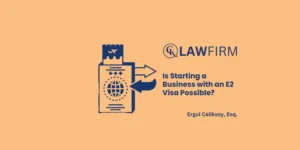Schedule an Appointment with Our Attorneys Now

U.S. Press Visa: All You Need to Know
By Asim Kilinc, Immigration Attorney at CK Law Firm
For foreign nationals looking to engage in journalism, media, or other press activities in the United States, the U.S. Press Visa, or I Visa, is the ideal option. This visa is aimed at media professionals and journalists who meet specific requirements and need to conduct short-term press-related duties in the U.S. In this article, we’ll cover the application process, eligibility criteria, and other important details regarding the I Visa.
- What is the U.S. Press Visa?
- Who Can Apply for the U.S. Press Visa?
- What Are the Requirements for the U.S. Press Visa?
- U.S. Press Visa Application Process
- What Activities Can Be Conducted with the U.S. Press Visa?
- How Long Can I Stay in the U.S. with a Press Visa?
- Can I Apply for a Green Card with the U.S. Press Visa?
For additional questions, feel free to reach out through the comments section of this post, send me a message directly on LinkedIn, or contact me through the website of CK Law Firm, an Immigration Law firm I co-founded.
What is the U.S. Press Visa?
The U.S. Press Visa is a special visa issued to individuals traveling to the United States to perform press-related work temporarily. Journalists, filmmakers, reporters, photographers, and other media workers can apply for this visa. With this visa, you can work in the U.S. for a specified period while continuing your press activities.
Who Can Apply for the U.S. Press Visa?
The U.S. Press Visa (I Visa) is available to foreign media personnel engaging in temporary press and media activities in the United States. Those eligible to apply include:
- Journalists: Professional journalists who will gather news, conduct interviews, and report on events in the U.S.
- Filmmakers: Producers, directors, and camera operators involved in non-commercial documentary or film projects.
- Reporters: Reporters working for international media outlets, reporting news or events from the U.S.
- Photojournalists: Professional photographers taking photos for news outlets.
- Editors and Writers: Individuals writing or editing content for newspapers, magazines, TV, or radio outlets.
- Technical Staff: Technicians providing necessary support for media organizations and working temporarily in the U.S.
Applicants must be full-time employees of a media organization, working on a temporary assignment in the U.S. Freelancers or those involved in commercial projects may not qualify for the I Visa.
What Are the Requirements for the U.S. Press Visa?
Applicants for the U.S. Press Visa must meet specific criteria:
- Media Professional: You must provide proof that you are employed in the media industry. This can include official documents showing you work for a newspaper, TV channel, magazine, or other media organization.
- Temporary Assignment: You must state that you are in the U.S. temporarily for press-related duties. The U.S. Press Visa cannot be used for permanent jobs or to settle in the U.S.
- Press Activities: You must demonstrate that the activities you will be conducting in the U.S. are related to journalism or media, such as news gathering, reporting, or filming.
- Full-Time Employment: Freelancers are generally not eligible for this visa. You must be employed as a full-time worker for a media organization.
U.S. Press Visa Application Process
Filling Out the DS-160 Form:
Like other U.S. visas, applicants for the Press Visa must complete the DS-160 form online. This form is the foundation of your application and includes your personal information.
Payment of Application Fee:
A specific fee must be paid during the application process, which may vary depending on the consulate.
Supporting Documents:
You will need to provide supporting documents such as your media ID, a letter from your employer, and proof of your work.
Interview Appointment:
You will be required to attend an interview at the U.S. consulate. During the interview, you will need to explain the press-related activities you will be conducting in the U.S. and provide accurate documentation.
Visa Approval:
Once your application is approved, you will receive your U.S. Press Visa along with your passport. The visa’s duration will depend on the length of your assignment and any applicable agreements.
What Activities Can Be Conducted with the U.S. Press Visa?
With the U.S. Press Visa, you can engage in specific media and journalism activities in the U.S., including:
- News Gathering and Reporting: Journalists and reporters can gather and report news in the U.S.
- Documentary or Film Production: The Press Visa allows you to participate in the production of documentaries or films, provided they are not for commercial purposes.
- International Broadcasting: You can carry out work on behalf of foreign media organizations operating in the U.S.
How Long Can I Stay in the U.S. with a Press Visa?
The Press Visa is a temporary visa, and your stay in the U.S. is limited to the duration of your assignment. You are generally expected to leave the U.S. once your assignment is completed. However, in some cases, you may apply for an extension and renew the visa.
Can I Apply for a Green Card with the U.S. Press Visa?
The U.S. Press Visa is a temporary work visa and does not provide a direct path to a Green Card.
Frequently Asked Questions
- How long does the U.S. Press Visa application take?
The application process can take several weeks. However, this may vary depending on consulate processing times. - Can I bring my family to the U.S. with a Press Visa?
Yes, Press Visa holders can bring their spouse and children under 21 to the U.S. A separate application is required for family members. - Can freelance journalists apply for the U.S. Press Visa?
Generally, freelance journalists are not eligible for the U.S. Press Visa. However, if you work for a specific media organization, you may be eligible.
Conclusion
The U.S. Press Visa is an ideal option for foreign journalists and media professionals who need to work temporarily in the U.S. By ensuring you submit the correct documentation and follow the application steps carefully, you can expedite the approval process. At CK Law Firm, we guide you through the visa application process, helping you take the correct steps. For professional support and detailed consultation, reach out to us via cklawfirm.org, info@cklawfirm.org, or LinkedIn.
Who is Attorney Asım Kılınç?
Attorney Asım Kılınç is the co-founder of CK Law Firm and is recognized for his expertise in immigration law and U.S. asylum applications. Kılınç completed his Master’s degree at Southern Methodist University Dedman School of Law and is a member of the Missouri Bar Association, with a focus on U.S. immigration law.
Attorney Kılınç’s extensive knowledge and experience in immigration law have significantly contributed to CK Law Firm’s success in this field. He has actively participated in the preparation of over 1,000 cases, demonstrating his expertise in this area. By providing comprehensive and professional legal support to his clients, he helps them adapt to their new lives in the U.S.
Attorney Kılınç is also well-versed in U.S. asylum applications. He meticulously guides his clients through the process and ensures they receive the best legal advice. He provides top-quality service to clients in matters of citizenship, Green Card, work permits, and other immigration processes, supporting them from start to finish on their journey to U.S. citizenship.
Attorney Asım Kılınç, who solidifies CK Law Firm’s leadership in immigration law and U.S. asylum applications, offers reliable and effective legal consultancy services to clients, assisting them in building a new life in the U.S.





